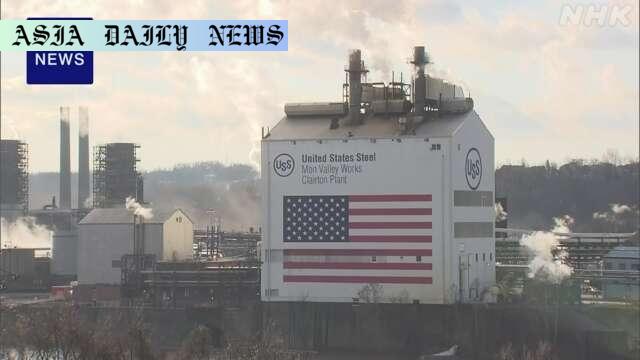US Steel thanks Trump for his interest in a thriving future during talks involving Nippon Steel’s investment agreement.
Key Point 1: US Steel expresses gratitude to President Trump for his proactive support during ongoing Nippon Steel negotiations.
Key Point 2: Trump announced Nippon Steel’s agreement to invest heavily in US Steel instead of outright ownership.
Key Point 3: CEO David Burritt met Trump at the White House ahead of the US-Japan leadership summit.

US Steel Receives Trump’s Support Amid Growing Negotiations
The ongoing negotiations between US Steel and Japanese steelmaking giant Nippon Steel have become a focal point in recent discussions surrounding the future of the American steel industry. In a show of support, President Donald Trump has put forward his interest in securing a thriving future for US Steel, seeking to ensure its continued dominance in the market while balancing prospective international investments. This development comes amidst reports of Nippon Steel looking to acquire or invest in the American steel manufacturer.
CEO Burritt’s White House Meeting and Trump’s Role
On Thursday, US Steel’s CEO David Burritt met with President Trump at the White House to discuss the future of the company as it faces heightened interest from Nippon Steel. The meeting preceded a high-level summit between the United States and Japan, during which Trump shared that Nippon Steel had agreed not to pursue full ownership of US Steel but, instead, to focus on significant investments. This move has been interpreted as a strategic approach to preserving US Steel’s autonomy while enabling an influx of foreign capital to bolster operations.
Insight into Nippon Steel’s Interest
Nippon Steel’s interest in US Steel is reflective of the global steel market dynamics, where partnerships and acquisitions have become crucial for maintaining competitive advantages. Japan’s largest steelmaker sees a lucrative opportunity in expanding its footprint in the United States—a market that holds immense potential for infrastructure and industrial steel demands. However, the sensitive nature of foreign acquisitions, particularly in industries deemed critical to national security, has prompted heightened scrutiny and intervention.
The Economic Implications of Trump’s Intervention
The President’s involvement signals the importance of maintaining US-based enterprises’ independence while enabling constructive collaborations with international players. Trump’s support has drawn attention to policies that underlyingly prioritize domestic industries’ sustainability, employment rates, and technological advancements. By encouraging investments instead of outright acquisitions, the administration appears intent on striking a balance between fostering foreign capital and protecting national interests.
A Brighter Future for US Steel
Amid this development, US Steel has expressed optimism about its trajectory and the implications of Trump’s backing. A recent social media post featuring a photograph of Burritt and Trump was accompanied by a note thanking the President for his interest in steering the company toward a “thriving future.” Such sentiments are likely to resonate with shareholders, employees, and industry insiders who regard this intervention as a stabilizing move during uncertain times.
Challenges and Opportunities Ahead
While the situation brings hope, challenges remain. A steadfast commitment to energy-efficient and environmentally sustainable steel production is increasingly central to industry success. Additionally, navigating geopolitical tensions and economic policies will shape how US Steel and Nippon Steel advance this collaboration. The fusion of capital, expertise, and bilateral cooperation places the company in a pivotal position to innovate and grow.
Conclusion
The alliance between US Steel and Nippon Steel opens a new chapter in cross-border industrial partnerships. With Trump’s support ensuring the safeguarding of national interests, the collaboration reflects a delicate balance between fostering foreign investments and preserving domestic autonomy. Moving forward, the American steel industry will likely play a key role in bolstering economic progress, especially with strategic decisions ensuring its global competitiveness.
Commentary
The Significance of Trump’s Support for US Steel
President Trump’s involvement in the emerging partnership between US Steel and Nippon Steel showcases the administration’s proactive stance on safeguarding critical American industries. This intervention reflects a broader strategy to enhance domestic economic stability while facilitating international collaborations that align with national interests.
Balancing Investments and Ownership
Trump’s preference for Nippon Steel to invest heavily without pursuing outright ownership of US Steel demonstrates a key economic principle: safeguarding vital industries’ autonomy. By maintaining US Steel’s independence, policymakers aim to mitigate potential risks associated with foreign ownership, such as losing local control over strategic assets.
The Economic Opportunities at Stake
At a time when the demand for steel in infrastructure and innovation industries is set to surge, this collaboration positions US Steel to capitalize on emerging opportunities. Nippon Steel’s capabilities in technology and resources could significantly boost operational efficiency, enabling US Steel to stay competitive in the global market.
Final Thoughts
Trump’s approach highlights the intricate balance required between embracing globalization and ensuring national security. As businesses and policymakers navigate these complex dynamics, the importance of fostering mutually beneficial relationships while prioritizing economic prosperity cannot be overstated. The future of US Steel, bolstered by these strategic developments, holds promise for both domestic growth and international cooperation.


